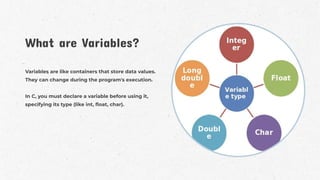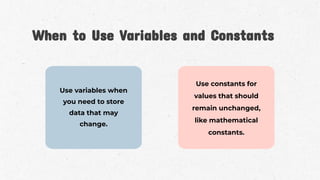LDP - Variables and Constants - Technology
- 1. int age = 21; const int age = 21; VARIABLES CONSTANTS VS Presented to : XYZ Presented by : Rishabh
- 2. Variables are like containers that store data values. They can change during the program's execution. In C, you must declare a variable before using it, specifying its type (like int, float, char). What are Variables?
- 3. Constants are fixed values that do not change during the program's execution. In C, you can define constants using the 'const' keyword or by using preprocessor directives like #define. What are Constants?
- 4. Variables can change their value, while constants remain the same. Variables require memory allocation, whereas constants do not. Variables are declared with a type, constants can be defined in various ways such as const int age = 21 or #define PI 3.14 Key Differences Between Variables and Constants
- 5. To declare a variable, you specify the type followed by the variable name. For example: int age; float salary; char grade; Declaring Variables in C
- 6. You can define a constant like this: const float PI = 3.14; This means the value of PI will always hold the value 3.14 throughout the program. Using Constants in C
- 7. Use constants for values that should remain unchanged, like mathematical constants. When to Use Variables and Constants Use variables when you need to store data that may change.
- 8. Example for Variables and Constants : #include <stdio.h> int main() { int age = 18; const float PI = 3.14; printf('Age: %d, PI: %.2f', age, PI); return 0; }
- 9. THANK YOU VERY MUCH! For tolerating!*









